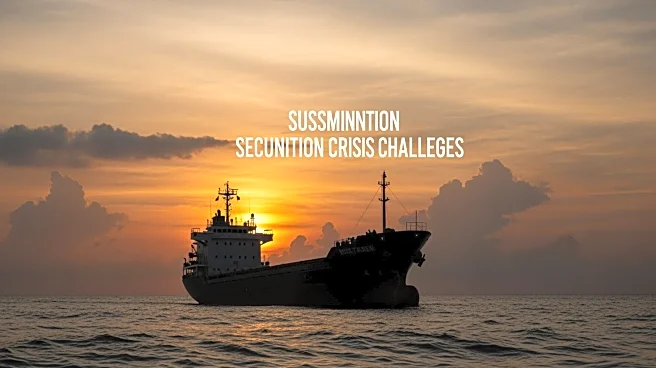What's Happening?
Swiss-based shipping company MSC has announced the suspension of all bookings and overland cargo transport destined for Mali due to serious security concerns and a crippling fuel shortage. The blockade, imposed by al-Qaeda-linked militants, has largely
paralyzed the capital, Bamako, and disrupted daily life across the landlocked country. The militant group Jama'at Nusrat al-Islam wal-Muslimin (JNIM) has targeted fuel-tanker convoys attempting to reach Bamako, putting immense pressure on Mali’s military-led government. MSC cited major operational challenges caused by safety concerns and a fuel shortage as reasons for the suspension. French shipping firm CMA CGM reported similar difficulties but reversed an earlier decision to suspend shipments after consultations with Mali’s transport ministry.
Why It's Important?
The suspension of cargo services by MSC, a major player in global shipping, highlights the severe impact of Mali's security and logistical challenges on international trade. MSC's decision is significant due to its vast operations in Africa, handling approximately 22 million TEU annually and connecting regional ports with global supply chains. This move may serve as a barometer for other logistics companies, potentially exacerbating Mali’s economic and supply-chain vulnerability. The ongoing crisis in Mali, marked by armed groups and intercommunal violence, poses a threat to regional stability and international cooperation, affecting trade and economic development in West Africa.
What's Next?
The suspension of services by MSC could lead to increased pressure on Mali’s government to address security and logistical issues. Other logistics companies may follow suit, further isolating Mali economically. The government may need to seek international assistance to stabilize the situation and restore confidence in its ability to secure vital resources and maintain trade routes. The ongoing instability could prompt regional and international stakeholders to reassess their involvement and strategies in Mali, potentially leading to diplomatic and economic interventions.
Beyond the Headlines
The crisis in Mali underscores the broader challenges faced by landlocked countries in maintaining secure and efficient trade routes. The proliferation of armed groups and intercommunal violence highlights the need for coordinated international efforts to address security and governance issues. The situation also raises ethical concerns about the impact of militant activities on civilian populations and the role of international companies in navigating complex geopolitical landscapes.















